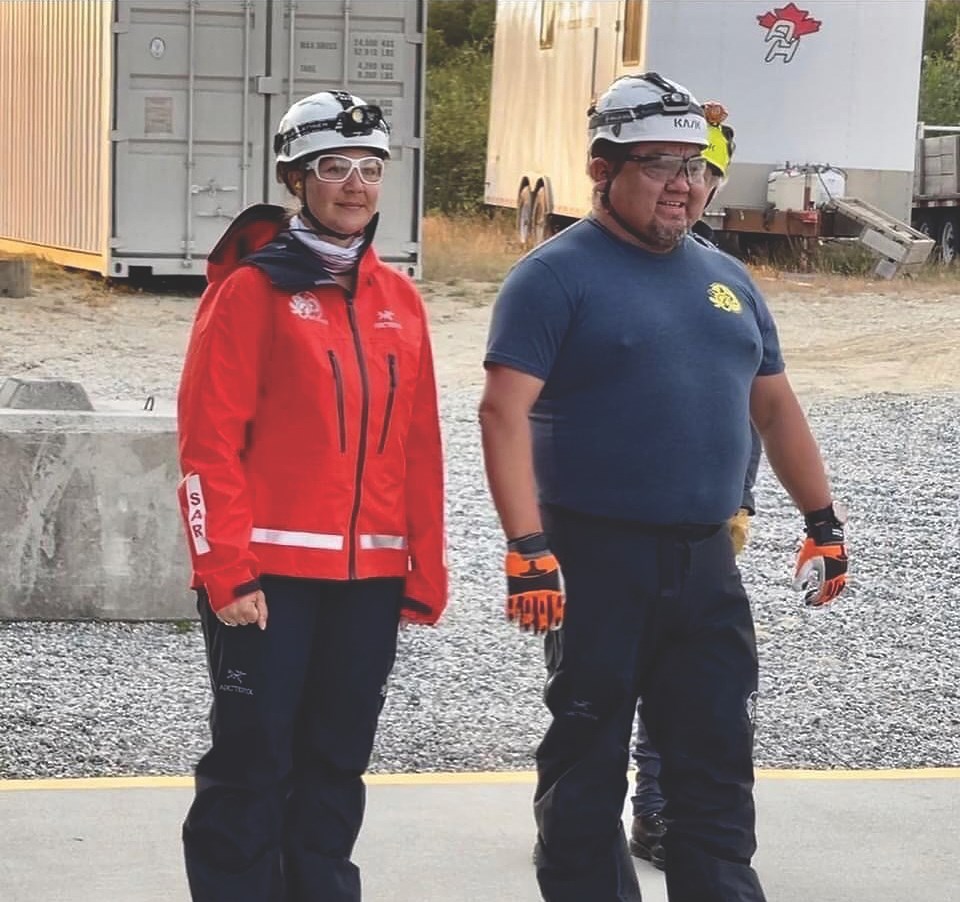In our first in a series of community profiles featuring neat locals, we talk with husband-wife Sunshine Coast Search and Rescue members Genevieve and Joachim Pierre. The Coast Reporter talked with the two separately so the following Q&A has been edited for style, clarity, space and to merge their answers.
How did you get involved with SAR?
J: We’ve got three daughters and they’re at the age where two of them have moved out and the third one is independent enough that we were looking for some activities to do. We thought Search and Rescue would be a great fit for us, just to give back to our community, seeing that we were both kind of raised on the Sunshine Coast.
What surprised you about Search and Rescue?
J: I didn’t realize how organized they are. And the unity within the group. Everybody was so welcoming and the atmosphere was great. I knew it was going to be good – I didn’t know it was going to be that good.
G: I definitely didn’t anticipate the level of training and the amount of training that you can continue to do. It’s definitely a lot of work. We need to put the time in to be good and knowledgeable about what we’re doing. I went in knowing ‘Oh, I’m great at hiking and I love the back country,’ but there’s way more hands-on learning that needs to happen than just enjoying the outdoors.
When did you join?
J: Two and a half years ago.
Just before the pandemic?
J: Yeah, so it was very challenging for our group. The training matrix to be certified as a Search and Rescue member was supposed to take six or eight months. It took us just about a full year.
What does being a part of SAR involve?
J: Anything from team dynamics, to first aid, to tending to people lost in the wilderness. It’s a good variety.
Did you have any first responder training before SAR?
J: I work at the gravel pit in Sechelt and I’m heavily involved with safety stuff at work. I used to be coach of the mine rescue team and I’m co-chair of the Occupational Health and Safety Committee. It was a nice transition.
Can you tell me about your first search?
G: We were the closest to the scene so Joachim and I were the first SAR members there. The ambulance had gotten there first but we are authorized to go where regular first responders aren’t. So the ambulance attendants were having to stay at their “line.” Then, the rest of our team arrived and we got everybody onto the ambulance. [People] ended up being hurt but OK.
How do you look after your mental health when dealing with some difficult situations?
J: Everybody reacts a little bit different. I find that as a group, everybody’s very conscientious of team members – that means talking to or supporting them, I guess. On top of that, we have crisis incident stress management (CISM), essentially professional certified counsellors that we have within the British Columbia Search & Rescue Assocciation. So there are lots of resources out there for us. Cool thing about it is my wife actually just got certified in that.
Genvieve, you’re now on the provincial mental health team, what are some of the skills and training that go into protecting members’ mental health?
G: I work with every SAR team in B.C. so if we have what we call a critical incident stress call and most commonly it’s a body recovery, but sometimes it can be difficult for teams if they haven’t found somebody. That can sometimes be just as hard as finding somebody. Anytime a team feels like they need some extra help and extra guidance, they give us a call. We walk the teams through a conversation, some pointers, some helpful tips, and then we give out information if they feel like they need further assistance. Because sometimes during busy seasons, you can have hard call after hard call, and it can be hard to be resilient and bounce back and be ready for the next one.
Any advice for people considering joining SAR?
J: Be prepared to be part of a great team.
G: Yes, sign up. Put your name in if you’re the kind of person who has a strong dedication, commitment to community, is interested in always learning new things and challenging their mind and body. It’s a wonderful program and the community response is fabulous. When you tell people you are part of SAR, people get this glow about them and everybody is so thankful.
Being on the team is fabulous. I see many of these people on my own time. They’re definitely not just my teammates, they’re my friends now.



